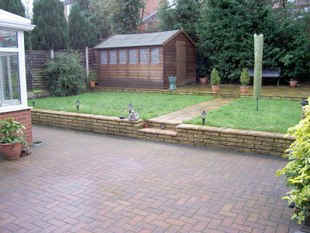Chester City Council - now Cheshire West and Chester Council
- an example of licensed thuggery using Section 215 of the Town and Country Planning Acts.
If local councils have nothing better to do
than expend time telling residents to destroy areas of wildlife habitat just because an
arguably narrow-minded or vexatious neighbour complains, then both their funding levels
and staff numbers need to be reduced. Do people really want council tax to be spent
pursuing small-minded vendettas?
If local councils became heavily involved
in every neighbourhood spat involving a few overhanging branches then we would need to
employ hundreds more local government officials. Maybe that is the aim! This part of SeeRed documents just part of the dispute that occurred when Leslie
Smith (then a planning officer with Chester City Council) tried to exceed his proper
authority.
More seriously, this is one of many
examples of why s.215 of the Planning Act needs to be repealed - simply because local
councils clearly cannot be trusted to use this draconian legislation fairly and for the
purposes for which it was originally intended. Probably the only people to emerge with
some credit are the staff of Chester Magistrates Court who were helpful both to me (SeeRed author) and to the person who was being threatened with
prosecution - and under legislation that deems anyone guilty until they prove their
innocence. This case dates from 2008.
A more resent (2010) case was reported nationally in the Press and because it was
heard at a Crown Court may have set some sort of case law upon which others can rely.
Cases heard in lower courts do not set a precedent.
We need the tonic of wilderness
............... We can never have enough of nature.
Henry David Thoreau 1817-1862
This section of SeeRed
documents the case of a resident of Chester whose only 'crime against the State' was to
allow his garden to become overgrown. A neighbour (probably a devotee of Chester in Bloom
- a part of Britain in Bloom) complained to the City Council.
The complaint was met not with a proper investigation of all the circumstances but with
dictatorial threats under s.215 by Leslie Smith - a senior planning enforcement officer.
The whole episode, even in the first couple of weeks, read like something out of Franz
Kafka's "The Trial".
A formal notice under S.215 was issued in
September 2008 - a few days before press comment centred (once again) on saying that local
councils should mind their own business and allow people to grow what they wish in their
own gardens. The formal notice is reproduced here,
and the press comment is here.
Here is the text of the first email I
received.
The house owner had searched Google and found my section 215 page.
12 June 2008.
Hi.
I have been reported to Chester City Council by a neighbour about the state of my back
garden.
It is overgrown by natural growth of what could be considered weeds. I disagree.
I have let nature do what it does naturally. I have no idea what they are but I must admit
that they are quite tall. I estimate the tallest at around 12 feet.
I have been visited by a senior planning enforcement officer who told me that I would have
to clear the garden in order to accommodate my neighbour's wishes.
There is no rubbish, just natural vegetation.
My neighbour, the complainant remains anonymous but I think I know who it is.
He has a perfectly flat lawn and is probably proud of it.
I disagree. I think his garden is worse than mine as it is not natural but man made.
Everyone must remember that vegetation provides vital oxygen and a place where wildlife
can freely exist.
The complainant and council consider my back garden as an eyesore.
I suggest that if they don't like it, don't look at it.
There are problems with dogs around my house, they bark constantly.
This is something that cannot be ignored. You can close your eyes but not your ears.
However, I have not complained to the council about this nuisance as I am not a petty
person.
Can you give me some advice regarding the back garden?
Anything would be appreciated.
Thanks in advance
The house owner asked Chester City Council for details of the complaint - and quite
reasonably who had complained. Here is the response - note the emphasis on criminal
proceedings.
Tuesday,
June 17, 2008
Requests under the Freedom of Information Act are dealt with by another officer and I have
copied this e-mail to him. At the present time you have not committed an offence but a
failure to improve the land may result in the service of a notice requiring that certain
works be carried out. Failure to comply with the notice would be a criminal offence. In
view of this potential outcome our view is that the information you seek is exempt under
the freedom of Information Act as it could alter be disclosed to you under the Disclosure
Rules in criminal proceedings and that the premature release of information could hinder a
criminal investigation. I can tell you that the complaint was made by telephone and the
only communication I have had thus far has been by e-mail with you and a council officer
who deals with private sector housing.
Leslie Smith Senior Planning Enforcement Officer 01244 402538 l.smith@chester.gov.uk
The garden in question is well screened from public view - unlike the famous Sidford Wild Garden that was the subject of so much
publicity and orchestrated venom many years ago.
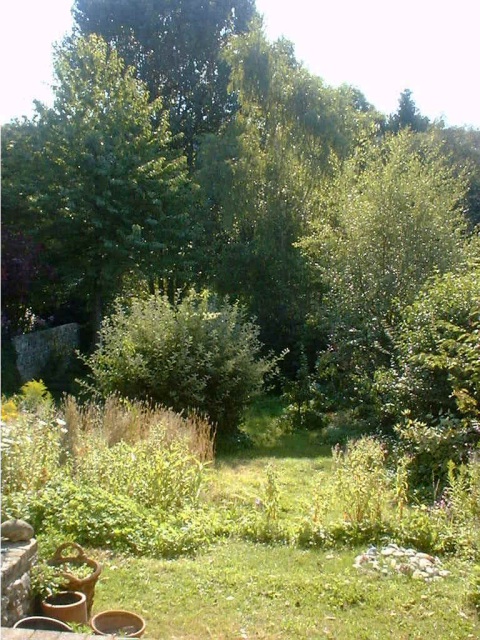 |
Part of an often admired 'wild' garden
near Sidmouth. Much of this garden in summertime was a dense wilderness full of wildlife.
Parts of the lawn were cut maybe twice a year. The adjoining property was formally
arranged with lawns and carefully weeded flowerbeds - and a summerhouse costing tens of
thousands of pounds!
But these properties were not on a high density new estate. They were occupied by
educated people who could respect different styles and tastes.
Many of the trees had been planted by the owner - some of them supplied by East Devon
District Council under its 'free trees' scheme.
If any new owner were to dislike
'untidiness' most of the wealth of habitats and biodiversity would be destroyed. |
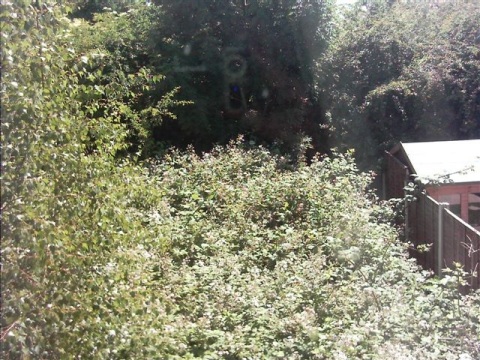 |
A view of the disputed garden in Chester.
Certainly there is a mass of vegetation, including a 3.5 metre high tree, no 'rubbish'
such as old sofas, and it is to the owners taste. Tall fencing panels can be seen - as in
the 'birds eye' photos. Similar gardens in the UK have been ordered to be 'cut down to
the ground' by council officials.
Other owners have been ordered to cut down all vegetation (including trees?) 'to a
height not exceeding one metre', so as to comply with the preferences of vexatious
neighbours of the 'Britain in Bloom' variety. |
Quite an old aerial view is shown below:
the estate is an outwardly pleasant development in a suburb of Chester.
To the rear of the property there is a line of tall trees and other vegetation. Amidst
all of this, the garden in question can hardly be said to be 'out of place' - it is merely
a small extension of a band of woodland. A tall hedge along one of the adjoining
properties gives privacy both from the 'disputed' garden and from the large area of
manicured lawn in one of the other adjoining properties. Again, this hedge appears to be
taller than much of the vegetation that Chester City Council tried to order be cut down.
The complainant may be the person who lives in the large house to the top right - there is
a large white van at the front and a large area of mown lawn to the rear - this lawn abuts
the side fence of the 'overgrown' garden.
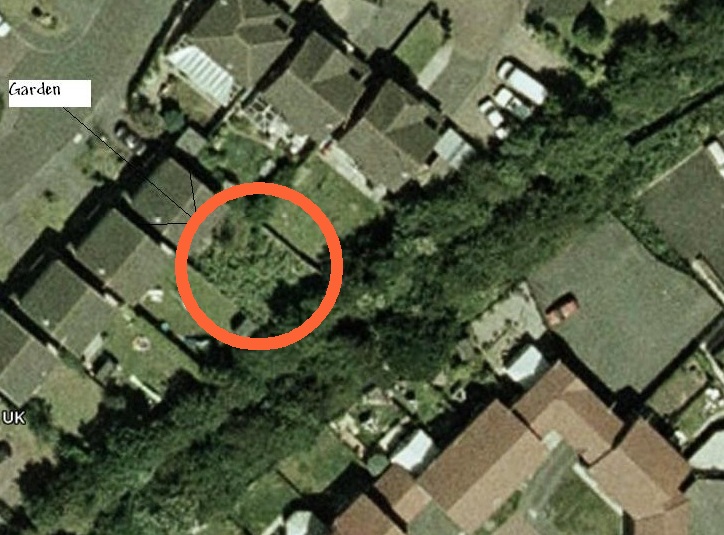
Another aerial view, this time from multimap is shown below. There is a
large trampoline in the rear garden of the house that may belong to the complainant, and a
small neatly mown area of front lawn. Having two areas of neatly mown lawn is doubly bad
for the environment - lawnmowers are polluting and noisy. Short grass also needs watering
in droughts (as do most Britain in Bloom plants). In all, maybe
the council should be applauding the owner of the wild garden, not threatening him.
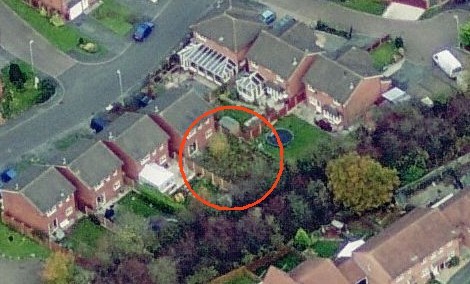
The large white van may indicate that the presumed complainant is in some sort of
market trader, builder or similar occupation. If you were buying an adjoining house, you
might want to know about this 'commercial' vehicle often being parked here. Many people
now use these on-line aerial photographs in their househunting! More recently Google
Steeetview has also become popular. The front garden of the house under dispute does not
have a neatly tended lawn as do so many of the others - but untidy as it might be, it
probably has greater ecological merit. Several gardens have trees in them, several have
tall hedges, and no doubt some even have a few weeds. Panel fencing supported by concrete
posts is a feature of the estate.
Any vegetation that overhangs adjoining gardens can of course be cut off (but in law it
should then be returned to its owner). Such matters are a commonplace part of living
alongside other people and should never become the subject of legal action - and
especially not under the draconian and one-sided provisions of s.215.
Indeed, it is curious that special legislation was needed to deal with a few cases of 30
foot high conifer hedges that were genuinely a serious blight on neighbouring properties!
Now, let us indulge in a little
speculation. Can a few pictures tell a story?
It is not difficult to see why this dispute
has arisen. The area is a moderately high density new estate with a mixture of house sizes
and values. On such estates people live almost on top of each other and this provides
ideal conditions for simmering resentment.
People living in the most expensive houses may look down on their poorer neighbours and
consider that the Council should automatically take their side in any petty dispute -
after all, in local government as elsewhere (and especially in planning departments),
money talks. The 'posh' 4-bedroom houses are typical of those inhabited by the newly
wealthy - business people made good, for example.
 |
 |
Examples of 4-bedroom houses
in this area of Chester. The whole estate has an unfortunate uniformity with small gardens
and manicured neatness. In these conditions it is common to find neighbours squabbling
over fences, overhanging bushes and the like - they live too close to each other and seem
to have nothing of substance to worry about! |
Regimented order was designed into the
estate. The pretentious architecture of the typical 4 bedroom houses would always attract
people to whom appearance matters more than substance. Likewise, the block paved driveways
are a fashion statement, although these may be a later addition. They are a characteristic
of people (and including many in Sidmouth, home of SeeRed) who have far
too much money to spend and desperately need the world to know about it. A £15,000
driveway is in effect merely a social statement - it serves no useful purpose over and
above that served by the often adequate driveway that it replaced. Wanton consumption of
raw material in this way is of course highly environmentally damaging - yet you would
expect councillors of all types to applaud the house owners for 'improving their
properties'!
Most of the gardens are small, formal and with little apparent wildlife potential. Some
examples are shown below. Paving over large areas of garden has been recognised as a
factor leading to increased surface water run-off in heavy rain - and is nowadays
controlled under planning legislation.
There are no rambling hedgerows, no untidy areas to offer a mix of wildlife habitats
and probably no garden ponds worthy of the name. The sterilised neatness outdoors is
mirrored indoors, as shown in these views of typical 4-bedroom houses. Nothing is out of
place, everything is sparkling, deodorised and the very latest in pampered consumer
living. In all, they are a wholly artificial environment. As priorities in the UK move
towards greater self sufficiency in food supply, imagine the uproar if one of the
residents started to grow vegetables in his front garden - or even to keep a few chickens!
But arguably, this is exactly what forward looking local councils should now be
encouraging. I have argued elsewhere that having
the populace attaining such a high standard of material living is merely a passing phase.
Unfortunately, this type of estate development can be seen throughout England.
Expensive cars are washed weekly - keeping up appearances is so important - and any blade
of grass or environmentally useful 'weed' that is so unwise as to grow is religiously cut
down. You can discern a lot about your neighbours from 'birds eye view' maps on the
internet, and people now use these extensively when house hunting.
Yet no house martin
with any sense would try to build a nest here - it would be destroyed well before the eggs
hatched - or maybe afterwards because of the awful noise made by the chicks. I know of
several cases in Sidmouth - these houses and gardens are tended so that every flower is
perfect and every weed destroyed. These prissy 'Britain in Bloom' people are in effect so
divorced from real nature (and the untidiness and disorder that are inherently a part of
the whole) that they seem to have become frightened by it.
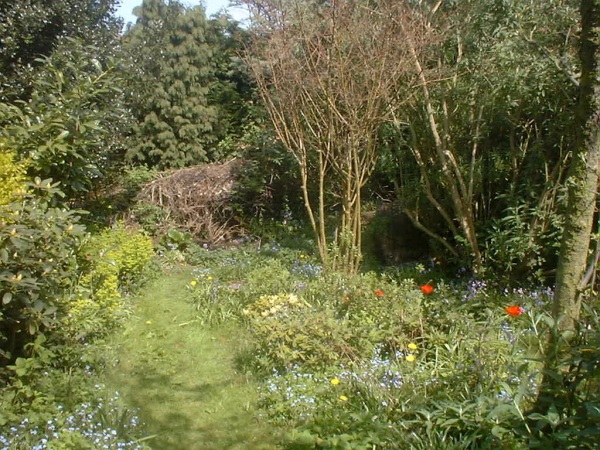 |
Generations of housemartins returned from
Africa each year for over 30 years to the same nest site on my late mother's house. I sold
it to someone who said she loved the garden that my mother had created - including the
large wild and overgrown areas (substantially untended for maybe 15 years) in which many
birds nested. One of the first actions of the new owners was to destroy the housemartins
nest. After all, bird droppings are so untidy! They also lavished money on acres of block
paving. Keeping up appearances? |
next page
top of section
home page






